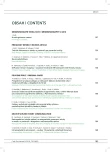-
Medical journals
- Career
Recovery from Decreased Cerebral Blood Flow in Wernicke’s Encephalopathy Following Abstinence from Alcohol – a Case Report
Authors: Y. Suzuki; K. Ogawa; M. Oishi; T. Mizutani
Authors‘ workplace: Division of Neurology, Department of Medicine, Nihon University School of Medicine, Tokyo, Japan
Published in: Cesk Slov Neurol N 2010; 73/106(2): 187-189
Category: Case Report
Overview
There have been few reports of recovery from reduced cerebral blood flow (CBF) in patients with Wernicke’s encephalopathy. We report a 70‑year‑old patient with a 2-day history of increased irritability and minimal vocalisation. Neurological examination revealed no abnormal findings. He was diagnosed as having Wernicke’s encephalopathy, because both the blood thiamine concentration and erythrocyte transketolase activity were low. SPECT revealed CBF reduction in many regions of the brain. After thiamine treatment, he reported that he had abstained from alcohol. Two weeks later, all symptoms had resolved completely. SPECT was repeated one month after onset and the CBF reductions observed in the first examination had recovered to almost normal levels. These results suggest that thiamine treatment and abstinence from alcohol can result in recovery from decreased CBF in patients with Wernicke’s encephalopathy, as long as the neurological symptoms are not severe.
Key words:
cerebral blood flow – single photon emission computed tomography – Wernicke’s encephalopathy – abstinence from alcohol
Sources
1. Suzuki Y, Oishi M, Mizutani T, Sato Y. Regional cerebral blood flow measured by the resting and vascular reserve (RVR) method in chronic alcoholics. Alcohol Clin Exp Res 2002; 26 (Suppl 8): 95S–99S.
2. Demir B, Uluğ B, Lay Ergün E, Erbaş B. Regional cerebral blood flow and neuropsychological functioning in early and late onset alcoholism. Psychiatry Res 2002; 115(3): 115–125.
3. Meyer JS, Tanahashi N, Ishikawa Y, Hata T, Ve-lez M, Fann WE et al. Cerebral atrophy and hypoperfusion improve during treatment of Wernicke‑Korsakoff syndrome. J Cereb Blood Flow Metab 1985; 5(3): 376–385.
4. Benson DF, Djenderedjian A, Miller BL, Pachana NA, Chang L, Itti L et al. Neural basis of confabulation. Neurology 1996; 46(5): 1239–1243.
5. Matsuda H, Yagishita A, Tsuji S, Hisada K. A quantitative approach to technetium‑99m ethyl cysteinate dimer: A comparison with technetium‑99m hexamethylpropylene amine oxime. Eur J Nucl Med 1995; 22(7): 633–637.
6. Johnson‑Greene D, Adams KM, Gilman S, Koeppe RA, Junck L, Kluin KJ et al. Effects of abstinence and relapse upon neuropsychological function and cerebral glucose metabolism in severe chronic alcoholism. J Clin Exp Neuropsychol 1997; 19(3): 378–385.
7. Sachs H, Russell JA, Christman DR, Cook B. Alteration of regional cerebral glucose metabolic rate in non‑Korsakoff chronic alcoholism. Arch Neurol 1987; 44(12): 1242–1251.
8. Altura BM, Altura BT, Gebrewold A. Alcohol‑induced spasms of cerebral blood vessels: relation to cerebrovascular accidents and sudden death. Science 1983; 220(4594): 331–333.
9. Crews FT, Miller MW, Ma W, Nixon K, Zawada WM, Zakhari S. Neural stem cells and alcohol. Alcohol Clin Exp Res 2003; 27(2): 324–335.
10. Nixon K, Kim DH, Potts EN, He J, Crews FT. Distinct cell proliferation events during abstinence after alcohol dependence: microglia proliferation precedes neurogenesis. Neurobiol Dis 2008; 31(2): 218–229.
Labels
Paediatric neurology Neurosurgery Neurology
Article was published inCzech and Slovak Neurology and Neurosurgery

2010 Issue 2-
All articles in this issue
- Body Weight Support Locomotion Training in Spinal Cord Injured Patients
- Huntington’s Disease
- Neurorehabilitation
- Diffusion Tensor Imaging – Current Possibilities of Brain White Matter Magnetic Resonance Imaging
- Subtypes of Ischemic Stroke and Vascular Risk Factors up to the Age of 50 – a Prospective Study
- A Comparison of the Czech Version of the Montreal Cognitive Assessment Test with the Mini Mental State Examination in Identifying Cognitive Deficits in Parkinson’s Disease
- Factors Influencing the Outcome of Surgical Treatment of Lumbar Disc Herniation
- Retrospective Study of Magnetic Resonance Imaging of the Brain and Spine in Neuromyelitis Optica
- Intramedullary Astrocytoma – a Series of 15 Patients and Literature Overview
- Unusual Clinical Picture in Migraine – Case Reports
- Recovery from Decreased Cerebral Blood Flow in Wernicke’s Encephalopathy Following Abstinence from Alcohol – a Case Report
- Czech and Slovak Neurology and Neurosurgery
- Journal archive
- Current issue
- Online only
- About the journal
Most read in this issue- Huntington’s Disease
- Unusual Clinical Picture in Migraine – Case Reports
- Retrospective Study of Magnetic Resonance Imaging of the Brain and Spine in Neuromyelitis Optica
- Neurorehabilitation
Login#ADS_BOTTOM_SCRIPTS#Forgotten passwordEnter the email address that you registered with. We will send you instructions on how to set a new password.
- Career

